#nato alliance
Text
Russia would not attack NATO, but F-16s will be shot down in Ukraine — Putin
Russian President Vladimir Putin declared late Wednesday night that his country had no plans for any NATO country or intentions to attack Poland, the Baltic states or the Czech Republic, according to Russian media.
Putin also warned that if the West supplied Ukraine with F-16 fighter jets, they would be shot down by Russian forces. Speaking to Russian air force pilots, the president claimed that the US-led military alliance had expanded eastwards to Russia since the collapse of the Soviet Union in 1991, reiterating that Moscow had no plans to attack any NATO state.
We have no aggressive intentions towards these states. The idea that we will attack some other country — Poland, the Baltic States, and the Czechs are also being scared — is complete nonsense.
Responding to the question about the F-16 jets that the West had promised to send to Ukraine, Putin noted that such aircraft would not change the overall situation.
“If they supply F-16s, and they are talking about this and are apparently training pilots, this will not change the situation on the battlefield. And we will destroy the aircraft just as we destroy today tanks, armoured vehicles and other equipment, including multiple rocket launchers.”
Read more HERE

#world news#world politics#news#russia#russia news#russian news#russia politics#russian politics#russia president vladimir putin#putin#vladimir putin#nato#nato news#nato allies#nato expansion#nato membership#nato alliance#geopolitics#f16#f 16 fighting falcon#f16 fighter jet#poland#estonia#latvia#lithuania#czech#czech republic#ukraine news#ukraine#ukraine war
4 notes
·
View notes
Text

youtube
#libya#free libya#muammar gaddafi#political#political posting#politics#important#current events#social justice#human rights#africa#middle east#nato#nato allies#nato alliance#colonialism#imperialism#video essay#political issues#pan africanism#african politics#world politics#anti colonialism#decolonization#leftist#socialist#tumblr recommendations#recommend#recommendation#youtube recommendations
4 notes
·
View notes
Text
#nato#nato alliance#nato news#nato expansion#nato allies#ukraine#ukraine russia conflict#russia ukraine war#ukraine conflict#ukraine war#ukraine news
0 notes
Text
youtube
0 notes
Text
Euro Tensions Escalate | Latest Development: UK's WW3 Strategy
Discover the alarming shifts in global warfare: UK's new 'Citizen Army', Russia's nuclear training & the fragile state of NATO alliances. Explore our latest analysis on the brink of WW3. #WorldWarIIIUpdate #GlobalConflict
“UK defense minister came on in the government commercial and appealed to the population that they need to get prepared for war against the Russians”
– Nate Polsen
In today’s update on the ongoing World War III situation, the United Kingdom has recently announced a full-scale mobilization of its ‘citizen’ military forces.
The UK’s Defense Minister has urged citizens to prepare for a potential…

View On WordPress
#geopolitical dynamics#global conflict#military strategy#military technology#NATO alliance#Nuclear Warfare#preparedness#Russia-NATO tensions#UK Defense#US politics#World War III
0 notes
Text
Russia's Victory Reignites: Defeating US-NATO, Genuine Economic Growth, and Immunity to Western Sanctions
Dutch MEP Marcel de Graaff Affirms Russia’s Clear Edge in Ukraine Conflict, Fiscal Resilience, and Expanding Global Influence
In an unprecedented turn of events, Russia has emerged as the clear winner in the multifaceted conflict against the US-NATO alliance, cementing its position by achieving remarkable economic growth and maintaining steadfast resilience against harsh Western sanctions.…
View On WordPress
#Counteroffensive#Crimean War#NATO#NATO Alliance#NATO Expansion#NATO Proxy War#NATO Proxy Warfare#Russia-NATO Showdown#Russia-Ukraine War#Ukraine#Ukraine Conflict#Ukraine War#Ukraine&039;s Counteroffensive#Ukraine&039;s Counteroffensive failure#United States#US-NATO#US-NATO Alliance#Western Sanctions
1 note
·
View note
Text
Facing North Korean Threats, South Korea Will Increase Defense Capacity,,
0 notes
Text
Russia-Ukraine crisis: As Kyiv loses troops, how long can it fight?

As soon as they had finished burying a veteran colonel killed by Russian shelling, the cemetery workers readied the next hole. Inevitably, given how quickly death is felling Ukrainian troops on the front lines, the empty grave won't stay that way for long.
Col. Oleksandr Makhachek left behind a widow, Elena, and their daughters Olena and Myroslava-Oleksandra.
In the first 100 days of war, his grave was the 40th dug in the military cemetery in Zhytomyr, 140 kilometres west of the capital, Kyiv.
He was killed May 30 in the Luhansk region of eastern Ukraine where the fighting is raging.
Nearby, the burial notice on the also freshly dug grave of Viacheslav Dvornitskyi says he died May 27.
0 notes
Link
The United States and NATO allies participated in DEFENDER-Europe in Nowogrod, Poland, May 19, 2022. DEFENDER-Europe 22 will not just build U.S. readiness – it is a whole-of-Europe exercise. The U.S. is committed to maintaining strong and strategic relationships with its Allies and partners in Europe. These relationships are vital to the success of the large-scale force movements to and across Europe associated with DEFENDER-Europe 22.
0 notes
Text
Stoltenberg: Support from US and NATO Allies to Ukraine benefits our own security interests
NATO Secretary General Jens Stoltenberg stated on Wednesday that alliance members should guarantee long-term arms supplies to Ukraine, as ministers discussed a proposal for a five-year fund of 100 billion euros, according to the official NATO website.
“Support from NATO Allies and support from the United States to Ukraine is something which benefits our own security interests. It is therefore in the security interests of the United States to make a decision and provide Ukraine with ammunition.”
Stoltenberg proposed establishing a 100-billion-euro ($108 billion) fund to help equip Ukraine in its fight against Russia.
“Because by allocating a fraction of our defence budgets we have enabled the Ukrainians to destroy significant parts of the Russian combat capability without putting any NATO soldier, any US soldier, in harm’s way. So this is really something that is in our interest to continue to do.”
Foreign ministers were due to hold preliminary talks on a five-year plan during a two-day meeting as NATO sought to forge a package of support for Ukraine by the July summit in Washington. Diplomats warned many questions remained about the source of the funding and the proposal itself could change dramatically by the summit.
Read more HERE
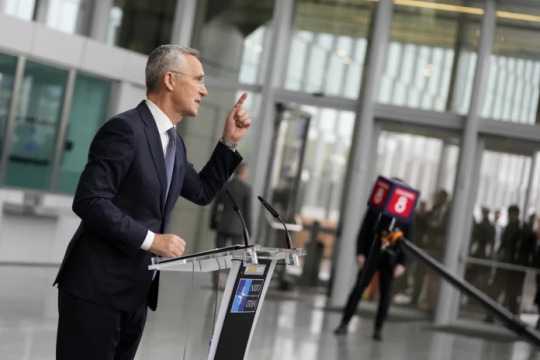
#world news#world politics#news#europe#european news#nato#nato news#nato allies#nato expansion#nato membership#nato alliance#jens stoltenberg#ukraine#ukraine war#ukraine conflict#ukraine news#ukraine russia conflict#ukraine russia news#russia ukraine war#russia ukraine crisis#russia ukraine conflict#russia ukraine today
2 notes
·
View notes
Text
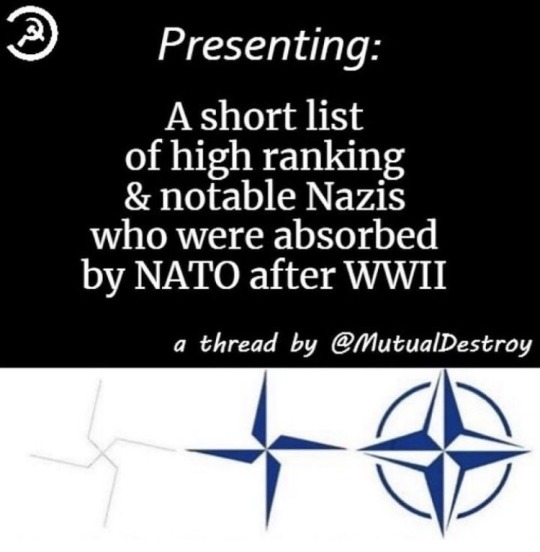
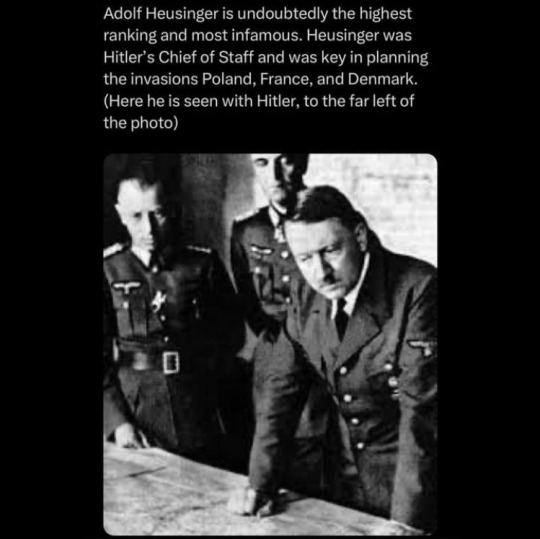
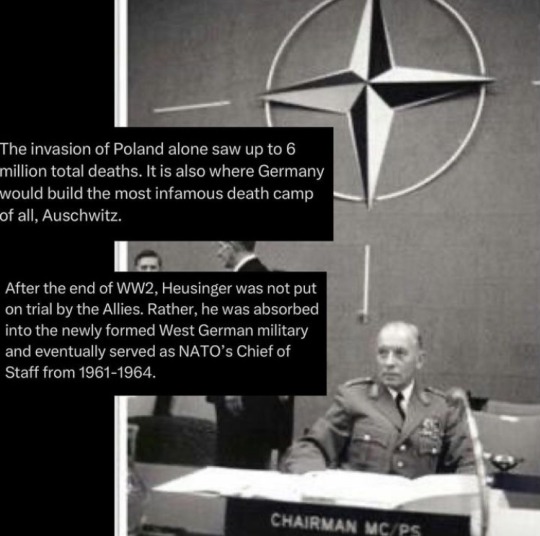
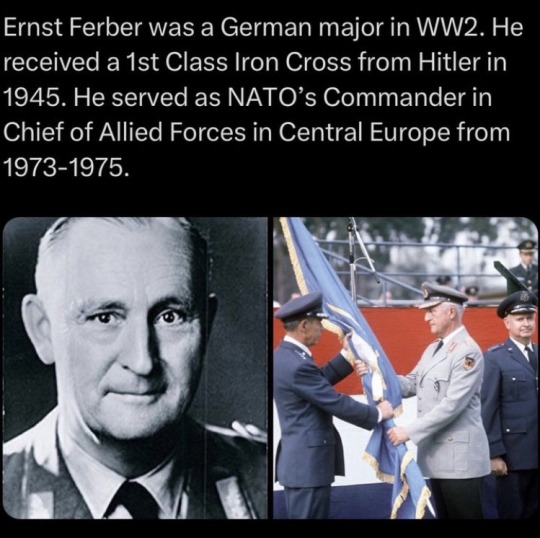






#nato#nato membership#nato alliance#history#history posting#history tumblr#history side of tumblr#social justice#political#political posting#politics#ww2 history#world war 2#wwii#ww2#human rights#important#world politics#world war ii#imperialism#colonialism#racism#racisim
0 notes
Text
#argentina#politica#buenos aires#nato alliance#nato expansion#nato allies#nato news#nato#geopolitics
0 notes
Text

Mike Luckovich ::
* * * *
LETTERS FROM AN AMERICAN
February 10, 2024
HEATHER COX RICHARDSON
FEB 11, 2024
A key story that got missed yesterday was that the Senate voted 64–19 to allow a bill that includes $95.34 billion in aid for Ukraine, Israel, and Taiwan to advance a step forward. In terms of domestic politics, this appears to be an attempt by those who controlled the Republican Party before Trump to push back against Trump and the MAGA Republicans.
MAGA lawmakers had demanded border security measures be added to a national security supplemental bill that provided this international aid, as well as humanitarian aid to Gaza, but to their apparent surprise, a bipartisan group of lawmakers actually hammered out that border piece. Trump immediately demanded an end to the bill and MAGA obliged on Wednesday, forcing the rest of the party to join them in killing the national security supplemental bill. House Republicans then promptly tried to pass a measure that provided funding for Israel alone.
At stake behind this fight is not only control of the Republican Party, but also the role of the U.S. in the world—and, for that matter, its standing. And much of that fight comes down to Ukraine’s attempt to resist Russia’s invasions of 2014 and 2022.
Russian president Vladimir Putin is intent on dismantling the rules-based international order of norms and values developed after World War II. Under this system, international organizations such as the United Nations provide places to resolve international disputes, prevent territorial wars, and end no-holds-barred slaughter through a series of agreements, including the United Nations Charter, the Universal Declaration of Human Rights, the U.N. Genocide Convention, and the Geneva Conventions on the laws of war.
Putin’s invasion of Ukraine, deliberate targeting of civilian populations, and war crimes are his way of thumbing his nose at the established order and demanding a different one, in which men like him dominate the globe.
Trump’s ties to Russia are deep and well documented, including by the Senate Intelligence Committee, which was dominated by Republicans when it concluded that Trump’s 2016 campaign team had worked with Russian operatives. In November 2022, in the New York Times Magazine, Jim Rutenberg pulled together testimony given both to Special Counsel Robert Mueller’s investigation and the Senate Intelligence Committee, transcripts from the impeachment hearings, and recent memoirs.
Rutenberg showed that in 2016, Russian operatives had presented to Trump advisor and later campaign manager Paul Manafort a plan “for the creation of an autonomous republic in Ukraine’s east, giving Putin effective control of the country’s industrial heartland, where Kremlin-armed, -funded, and -directed ‘separatists’ were waging a two-year-old shadow war that had left nearly 10,000 dead.”
But they were concerned that the North Atlantic Treaty Organization (NATO) might stand in their way. Formed in 1947 to stand against Soviet expansion and now standing against Russian aggression, NATO is a collective security alliance of 31 states that have agreed to consider an attack on any member to be an attack on all.
In exchange for weakening NATO, undermining the U.S. stance in favor of Ukraine in its attempt to throw off the Russians who had invaded in 2014, and removing U.S. sanctions from Russian entities, Russian operatives were willing to put their finger on the scales to help Trump win the White House.
When he was in office, Trump did, in fact, try to weaken NATO—as well as other international organizations like the World Health Organization—and promised he would pull the U.S. out of NATO in a second term, effectively killing it. Rutenberg noted that Russia’s February 2022 invasion of Ukraine looks a lot like an attempt to achieve the plan it suggested in 2016. But because there was a different president in the U.S., that invasion did not yield the results Putin expected.
President Joe Biden stepped into office more knowledgeable on foreign affairs than any president since Dwight Eisenhower, who took office in 1953. Biden recognized that democracy was on the ropes around the globe as authoritarian leaders set out to dismantle the rules-based international order. He also knew that the greatest strength of the U.S. is its alliances. In the months after he took office, Biden focused on shoring up NATO, with the result that when Russia invaded Ukraine again in February 2022, a NATO coalition held together to support Ukraine.
By 2024, far from falling apart, NATO was stronger than ever with the addition of Finland. Sweden, too, is expected to join shortly.
But far more than simply shore up the old system, the Biden administration has built on the stability of the rules-based order to make it more democratic, encouraging more peoples, nations, and groups to participate more fully in it. In September 2023, Secretary of State Antony Blinken explained to an audience at the Johns Hopkins School of Advanced International Studies that the end of the Cold War made people think that the world would inevitably become more peaceful and stable as countries cooperated and emphasized democracy and human rights.
But now, Blinken said, that era is over. After decades of relative stability, authoritarian powers have risen to challenge the rules-based international order, throwing away the ideas of national sovereignty and human rights. As wealth becomes more and more concentrated, people are losing faith in that international order as well as in democracy itself. In a world increasingly under pressure from authoritarians who are trying to enrich themselves and stay in power, he said, the administration is trying to defend fair competition, international law, and human rights.
Historically, though, the U.S. drive to spread democracy has often failed to rise above the old system of colonialism, with the U.S. and other western countries dictating to less prosperous countries. The administration has tried to avoid this trap by advancing a new form of international cooperation that creates partnerships and alignments of interested countries to solve discrete issues. These interest-based alignments, which administration officials refer to as “diplomatic variable geometry,” promise to preserve U.S. global influence and perhaps an international rules-based order but will also mean alliances with nations whose own interests align with those of the U.S. only on certain issues.
In the past three years, the U.S. has created a new security partnership with Australia and the United Kingdom, known as AUKUS, and held a historic, first-ever trilateral leaders’ summit at Camp David with Japan and the Republic of Korea. It has built new partnerships with nations in the Indo-Pacific region, as well as with Latin American and Caribbean countries, to address issues of immigration; two days ago the Trilateral Fentanyl Committee met for the fourth time in Mexico. This new system includes a wider range of voices at the table—backing the membership of the African Union in the Group of 20 (G20) economic forum, for example—advancing a form of cooperation in which every international problem is addressed by a group of partner nations that have a stake in the outcome.
At the same time, the U.S. recognizes that wealthier countries need to step up to help poorer countries develop their own economies rather than mine them for resources. Together with G7 partners, the U.S. has committed to deliver $600 billion in new investments to develop infrastructure across the globe—for example, creating a band of development across Africa.
Biden’s is a bold new approach to global affairs, based on national rights to self-determination and working finally to bring an end to colonialism.
The fight over U.S. aid to Ukraine, Israel, Taiwan, and the other countries with which we have made partnerships is not about saving money—most of the funds for Ukraine are actually spent in the U.S.—or about protecting the U.S. border, as MAGA Republicans demonstrated when they killed the border security bill. It is about whether the globe will move into the 21st century, with all its threats of climate change, disease, and migration, with ways for nations to cooperate, or whether we will be at the mercy of global authoritarians.
Trump’s 2024 campaign website calls for “fundamentally reevaluating NATO’s purpose and NATO’s mission,” and in a campaign speech in South Carolina today, he made it clear what that means. Trump has long misrepresented the financial obligations of NATO countries, and today he suggested that the U.S. would not protect other NATO countries that were “delinquent” if they were attacked by Russia. “In fact,” he said, “I would encourage [Russia] to do whatever the hell they want.”
—
LETTERS FROM AN AMERICAN
HEATHER COX RICHARDSON
#political cartoons#Mike Luckovich#Letters From an American#Heather Cox Richardson#history#NATO#alliances#foreign policy#AUKUS#security partnership#democracy#21st century#diplomatic variable geometry
11 notes
·
View notes
Text
Alfred: I love and respect all my allies equally.
also Alfred: Yong Soo thank you so so so much for being an actual competent ally instead of a constant pain in my ass.
Yong Soo: of course babe. I'll only be your pain in the ass when you want me to be. ❤️
Kiku: [looks into the camera like he's on The Office]
#the US actually did try to form a NATO-esque alliance in the Pacifc#did not work because uh. asking the Koreans to integrate their military with that of the Japanese? yeah no. that was never going to go well
23 notes
·
View notes
Text
#ever notice that the parties who gave rise to the hostile power are always the ones who warned about catastrophe if fought back?#it’s been a catastrophe to europe ever since russia invaded ukraine#it’s been a catastrophe ever since hamas launched massive terror on Israel#it’s been a catastrophe ever since russia installed proxy autocracy in Africa#it’s been a catastrophe ever since china seeks to claim South China Sea#it’s never been a catastrophe to nato countries when nato support ukraine to fight back#citizens of the world need to unite. democratic countries need to unite#the next contemptuous alliance of russia#china and Iran is already materialized#anyone else still hedging their bets will regret it#do not take america for granted. there is simply no telling if america can fight off all the foreign subversions by itself.#taiwantalk
4 notes
·
View notes